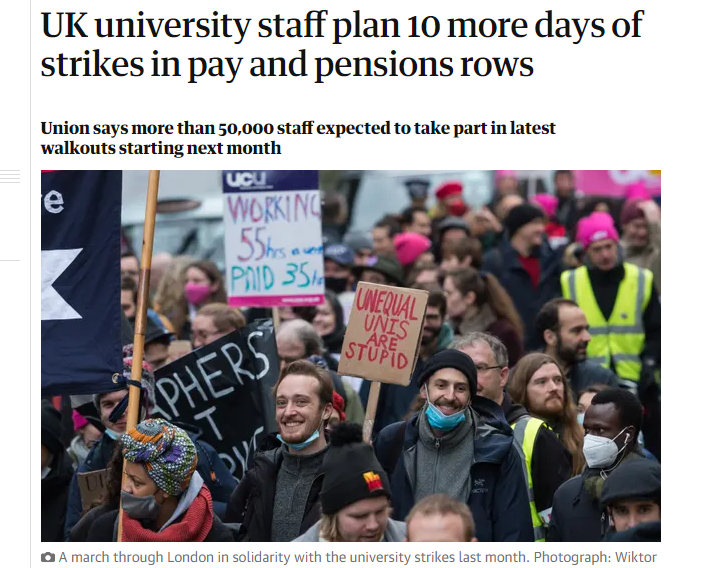Starting on the 14th of February university lecturers across the United Kingdom will be on strike. As a result, most in person classes are canceled. The strike is primarily over pensions, and Swansea University’s Student’s Union has issued statements of support for the strike. The strike will last for two weeks, and different lecturers are helping students deal the strike in different ways. As unionized higher education faculty are somewhat rare in the US compared to the UK and other European nations, such a nation-wide strike of lecturers (in the UK the term “professor” denotes that the holder is in some form of a “chair” position) may sound strange. It is an example of how students studying abroad should prepare themselves to deal with unfamiliar situations that arise from the differences between home and host nation.
Member lecturers in the United Kingdom are represented by “The University and College Union” which describes itself on its twitter as “University and College Union, UK trade union for academics, lecturers, trainers, researchers & academic-related staff in further and higher education.” The strike has been called for due to reoccurring cuts in pensions towards lecturers. While politicians and university administration that are opposed to the strike say this disruption will harm students, student unions across the country and at my campus have endorsed the strike. Further my own lecturers have talked with us about the upcoming strike and have offered solutions for missed class time after the strike.
For the most part the answer to missed lectures has been the release of pre-recorded lectures that will be released after the strike, and deadline extensions for small assignments such as quizzes. One professor has even offered to do an outside seminar where we can walk around town and discuss the history of the city. Personally, I plan to use the two weeks to keep up with class readings, researching for my papers, and maybe even seeing some castles in Wales. While I can not speak for students in other fields of study, as a history major, I also generally feel that the readings, which can still easily be done when lectures are canceled, are more helpful and essential for attaining a good grade in a course than lecturer content which is often posted online anyways.
The US is somewhat distinct, arguably in a negative sense, from many other nations in its comparatively weaker labor movement and workers’ protections. This means that working around industrial action can be a new experience for students, wither it’s a lecturer strike or some form of other worker’s strike. While it can seem complicated to deal with, such strikes are more of a headache for administration than they are for students in my recent, personal experience. While the prevalence of unions in many European nations and the greater frequency of strikes may seem intimidating to deal with to potential study abroad students, they should not deter them. If anything the generally better working conditions and labor rights can be instructive to American students.

